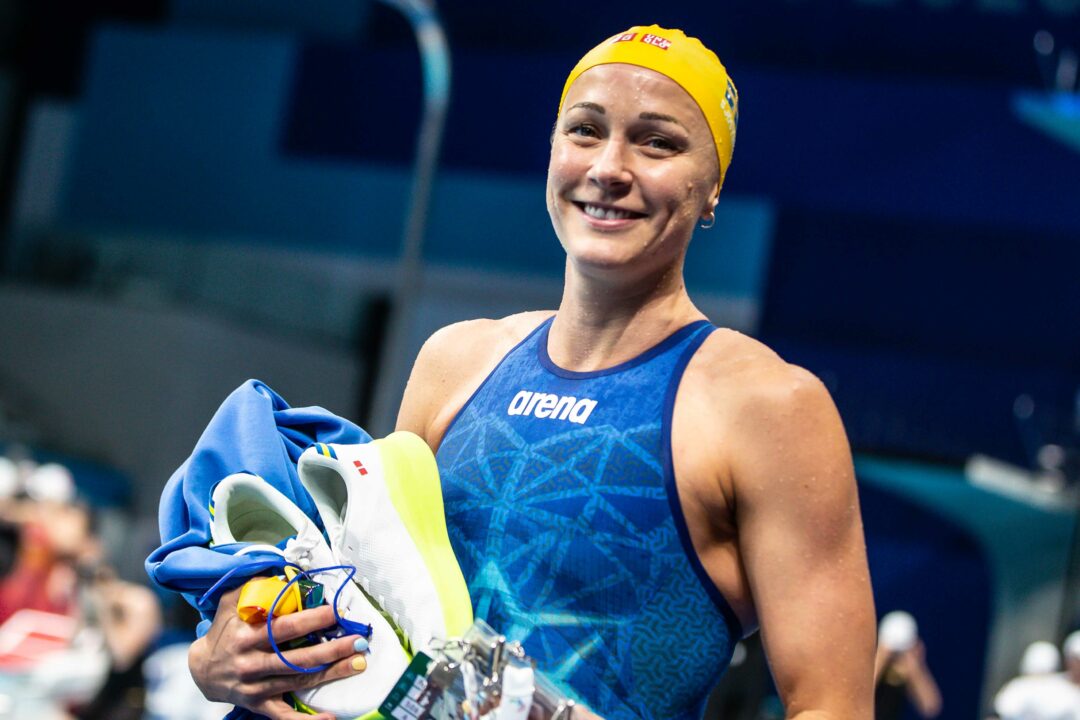In the history of World Aquatics Championships, some races have been incredibly close. There have even been some ties atop the podium.
Notably, this happened in two events at the 2011 Worlds in Shanghai: the men’s 100 backstroke, with Frenchmen Camille Lacourt and Jeremy Stravius sharing the gold medal, and in the women’s 100 freestyle, with Belarus’ Aliaksandra Herasimenia and Denmark’s Jeanette Ottesen landing alongside one another atop the podium.
On the other hand, there are other races in which a given swimmer is so dominant that they’re head and shoulders ahead of the runner-up.
Instagram’s Swimming Stats page has published the list of the biggest margins of victory in the history of the World Aquatics Championships. And there are some that really stand out.
View this post on Instagram
In women’s events, it is remarkable that Sweden’s Sarah Sjostrom managed, in a 50-meter race, to finish 78 one-hundredths ahead of the runner-up. This happened in 2017 in the women’s 50 fly. In fact, in the four times she has won the race, the smallest margin of victory was 0.33 in 2019.
Katie Ledecky also deserves a mention. In both the 800 free and the 1500 free, she is the only athlete to have won with a margin of victory in the double digits (10+ seconds): twice in the 800 and three times in the 1500.
The margin of victory of more than 7sevenseconds by Petria Schneider in the 400 IM in 1982 is noteworthy. Her world record of 4:36.10 lasted 15 years.
By comparison, in relative terms, no margin of victory exceeds that of Cornelia Sirch in the 200 backstroke in 1982, 5.05 ahead of Australia’s Georgina Parkes: this represents an average margin of 1.26 per 50 meters. Who comes closest is Leisel Jones, who in 2005 won the 200 breaststroke with a 4.12 advantage, or 1.03 every 50 meters.
View this post on Instagram
In the men’s events, it is remarkable that Australian Grant Hackett imposed a 24.38-second lead over Great Britain’s Graeme Smith in the 1500 freestyle in 2001. Even Katie Ledecky couldn’t get more than a 20-second advantage in the 1500.
Margins of victory of more than three seconds in 200-meter events in modern swimming represent great dominance, and that is why Michael Phelps‘ 200 IM win in 2003 and Kristof Milak’s 200 fly triumph in 2019 stand out among the rest – their world records, at the time, shocked the world.
Analyzing the average advantage per 50 meters, however, nobody surpasses East German Roland Matthes in the men’s events. Matthes won the 200 backstroke in 1973 with a world record time of 2:01.87, 4.02 seconds clear of the second-place finisher, or 1.005 every 50 meters. Having also won the 100 backstroke by 1.30 seconds, this is one of the reasons why he is considered by many as the most dominant backstroke swimmer in history.

Someone else mentioned to include the percentage to help show dominance. That would be cool. It would also be cool if we could see the difference of the 2nd highest winning margin for each event too. Like if the biggest margin in an event is 1 second, but the 2nd biggest margin was .30 that would be way more impressive than in an event where the 2nd biggest margin was .97.
By the way, on the 400 IM, the largest margin is now 4.06 s and not 4.04 s anymore (between Marchand and Foster)
Doubt that Hackett’s margin will disappear from this list until some wunderkind emerges in the future.
And yes – leaves a bad taste to see so many DDR names on these lists – we know they had an extra edge over their competition.
PS – It’s PETRA Schneider, not Petria..
Leisel Jones’ 2:21.72 was the most beautiful women’s breastroke I’ve seen until Chikunova WR swim early this year.
Both swims were extremely efficient, and beautiful.
Hackett in 2001 – so underrated. Unbelivable. (One of the few to survive the supersuit era which says everything).Was on the phone with my brother yelling at the TV. Beat second place by 24 seconds. More than Ledecky.
Last sentence – isn’t there a cloud over Matthes wins in 1973? For East Germany.
Milak the 2 fly goat
First 2 on the list were juiced
Kornelia Ender yes but Inge de Bruijn?
Yes.
Look up who her husband is.